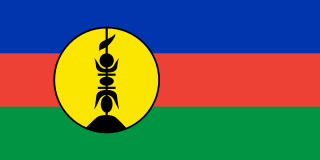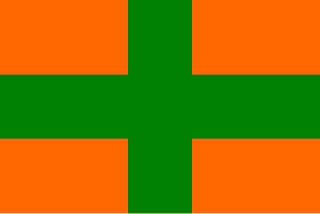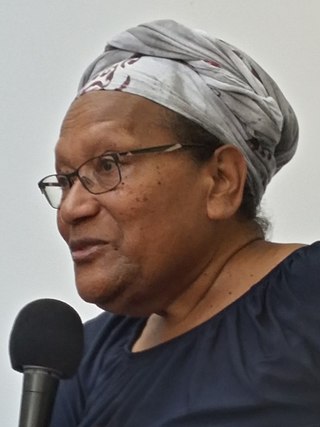
New Caledonia is a group of islands in the southwest Pacific Ocean, 220 km (140 mi) southwest of Vanuatu and 1,210 km (750 mi) east of Australia. Located 16,100 km (10,000 mi) from Metropolitan France, it forms a sui generis collectivity of the French Republic, a legal status unique in overseas France and enshrined in a dedicated chapter of the French Constitution.
The Ouvéa cave hostage taking occurred from 22 April 1988 to 5 May 1988 on the island of Ouvéa, New Caledonia, a south Pacific island under control of France. During the stand-off and seizure of a brigade of gendarmerie, members of an independence movement, the Kanak and Socialist National Liberation Front, killed four gendarmes and took 27 unarmed gendarmes hostages, later also taking hostage a public prosecutor who had been sent to negotiate, seven members of the French GIGN military unit and a regular army lieutenant. They demanded talks with the French government about independence for New Caledonia from France. In previous years, about ten gendarmes had been killed in New Caledonia in connection with the independence movement, also some Kanaks had been killed by policiers and gendarmes as well like Richard Kamuda in 1975, Théodore Daye in 1980, Eloi Machoro and Marcel Nonaro in 1985 and a young Kanak of the Saint-Louis tribe in 1987.

The Kanak and Socialist National Liberation Front is a pro-independence alliance of political parties in New Caledonia. It was founded in 1984 at a congress of various political parties. Its supporters are mostly from the Kanak indigenous population but also include supporters from other ethnic communities.

The Caledonian Union is a pro-independence and the oldest political party in New Caledonia. In the latest legislative elections of May 10, 2009, the party won around 11.65% of the popular vote, and 9 out of 54 seats in the Territorial Congress.

Maré Island or Nengone is the second-largest of the Loyalty Islands, in the archipelago of New Caledonia, an overseas territory of France in the Pacific Ocean. The island is part of the commune (municipality) of Maré, in the Loyalty Islands Province of New Caledonia.

The French Republic and the Republic of Vanuatu have long-standing bilateral relations which have varied over the years between tense and amicable. Vanuatu, then known as the New Hebrides, was a Franco-British condominium from 1906 to 1980, and maintained formal relations with both of its former colonial masters after gaining independence. Franco–Vanuatuan relations were rocked by a series of crises in the 1980s, and broke down completely on several occasions, with Vanuatu expelling the French ambassador in 1981, in 1984 and in 1987. Relations improved from the 1990s onwards and, today, France provides development aid to Vanuatu. The two countries also share amicable economic and cultural relations; both are members of the Organisation internationale de la Francophonie.
The Matignon Agreements were agreements signed in the Hôtel Matignon by Jean-Marie Tjibaou and Jacques Lafleur on 26 June 1988 between loyalists who wanted to keep New Caledonia as a part of the French Republic, and separatists, who wanted independence. The agreements were arranged under the aegis of the Government of France as a result of discussions and compromises arranged by Christian Blanc, the negotiator for Michel Rocard's government.
The Agency for the Development of Kanak Culture, on New Caledonia is an administrative agency, established in 1989, to preserve and promote Kanak and Pacific Islands culture, art and heritage. It was formed on the first anniversary of the signature Matignon-Oudinot Agreements to recognise and promote the values of Kanak culture.

The Jean-Marie Tjibaou Cultural Centre, on the narrow Tinu Peninsula, approximately 8 kilometres (5.0 mi) northeast of the historic centre of Nouméa, the capital of New Caledonia, celebrates the vernacular Kanak culture, the indigenous culture of New Caledonia, amidst much political controversy over the independent status sought by some Kanaks from French rule. It opened in June 1998 and was designed by Italian architect Renzo Piano and named after Jean-Marie Tjibaou, the leader of the independence movement who was assassinated in 1989 and had a vision of establishing a cultural centre which blended the linguistic and artistic heritage of the Kanak people.

A flèche faîtière is a carved rooftop spear, spire or finial that adorns Kanak houses, particularly the Great Houses of the Kanak Chiefs, in New Caledonia. The ceremonial carving is the home of ancestral spirits and is characterized by three major components. The ancestor is symbolized by a flat, crowned face in the centre of the spear. The ancestor's voice is symbolized by a long, rounded pole that is run through by conch shells. The symbolic connection of the clan, through the chief, is a base, which is planted into the case's central pole. Sharply pointed wood pieces fan out from either end of the central area, symbolically preventing bad spirits from being able to reach the ancestor. It evokes, beyond a particular ancestor, the community of ancestors. The flèche faîtière was depicted on a 2007 New Caledonian stamp.

The Kanaks are the indigenous Melanesian inhabitants of New Caledonia, an overseas collectivity of France in the southwest Pacific. Kanak peoples traditionally speak diverse Austronesian languages that belong to the New Caledonian branch of Oceanic. According to the 2019 census, the Kanaks make up 41.2% of New Caledonia's total population – corresponding to around 112,000 people. The other populations are the Caldoche, who are European born in New Caledonia; the Zoreille, who were born in metropolitan France and live in New Caledonia, in addition to about 10% that are non-Kanak Polynesians and 10% that are mixed race.

An independence referendum was held in New Caledonia on 4 November 2018. Voters were given the choice of remaining part of France or becoming an independent country.

Déwé Gorodey was a New Caledonian teacher, writer, feminist and politician. She was active in agitating for independence from France in the 1970s. She published poetry, short stories and novels. From 1999, she was a member of the New Caledonian government, representing the pro-independence Kanak and Socialist National Liberation Front. From April 2001 to June 2009, she served almost continuously as Vice President of the Government of New Caledonia.

An independence referendum was held in New Caledonia on 4 October 2020. The poll was the second to be held under the terms of the Nouméa Accord, following a similar referendum in 2018.
Legislative elections were held in New Caledonia on 18 November 1984. They had originally been planned for July, but were postponed due to threats by the Independence Front to boycott and disrupt the vote. Most members of the Front subsequently merged into the Kanak and Socialist National Liberation Front in September, and proceeded to boycott the elections. As a result, the Rally for Caledonia in the Republic won 34 of the 42 seats in a landslide victory. Following the elections, Dick Ukeiwé became President of the Government.
Early legislative elections were held in New Caledonia on 29 September 1985. They were called after the 1984 elections had been boycotted by the pro-independence Kanak and Socialist National Liberation Front (FLNKS) and were marred by violence that continued for several weeks after election day.
Emmanuel Kasarhérou is the curator of Musée du quai Branly – Jacques Chirac, located in Paris, France. He is the first Kanak person to head a major museum in mainland France. He is the former head of the Jean-Marie Tjibaou Cultural Centre in New Caledonia. He specializes in the art of New Caledonia and Oceanic cultures.
An independence referendum was held in New Caledonia, a French territory in the South Pacific, on 12 December 2021. The vote was the third and final one to be held under the terms of the Nouméa Accord, following votes in 2018 and 2020.
Marie-Claude Tjibaou is a former medal-winning athlete, Kanak activist and politician, and widow of the independence movement leader in New Caledonia, Jean-Marie Tjibaou.

Emmanuel Tjibaou is a French politician of the Caledonian Union who was elected member of the National Assembly for New Caledonia's 2nd constituency in 2024. He is the son of Jean-Marie and Marie-Claude Tjibaou.










